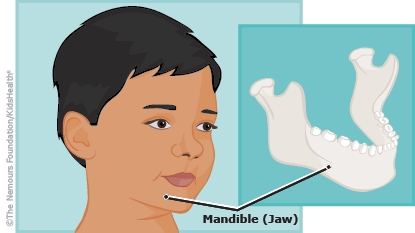Broken Jaw (Mandibular Fracture): How to Care for Your Child
A broken jaw can be painful. Rest, pain medicine, and a soft diet can help your child feel more comfortable while healing.


The mandible is the moveable lower jawbone. Mandibular fractures are uncommon in small children and more common in teens. They are caused by a strong blow to the jaw or chin, usually during a fall, fight, motor vehicle crash, or sports collision.
Health care providers use X-rays or a CT scan to confirm a jawbone is broken. All kids with a jaw fracture must follow up closely with a plastic surgeon or a specialist called an oral-maxillofacial surgeon (OMFS). Treatment depends on the child's age, location of the break, and whether it goes all the way through the bone.
For minor fractures, the health care provider may recommend treatment with pain medicine and a soft diet including liquids and foods that don't need to be chewed. This rests the jaw and allows it to heal on its own.
Sometimes the break is more severe or causes abnormal movement of the jaw. These fractures require repair by the specialist to line up the bone pieces and hold them together so they don't move during healing.
Children with jaw fractures generally heal in a few weeks.

-
Give your child any prescribed medicine as directed by the health care provider. Do not give other pain medicines without checking with your health care provider or pharmacist first.
-
Your child should eat a diet of liquids and soft foods that do not require chewing, such as yogurt, cottage cheese, scrambled eggs, pudding, soup, and pureed cooked fruit or vegetables.
-
Your child should not participate in sports, rough play, or gym until the health care provider says it's OK.


Your child:
-
Has pain that becomes worse or isn't relieved by pain medication.
-
Has a fever above 101°F (38.3°C).
-
Isn't able to drink liquids due to pain.
-
Is vomiting or can't keep down fluids.
-
Gets a loose tooth.

Your child: